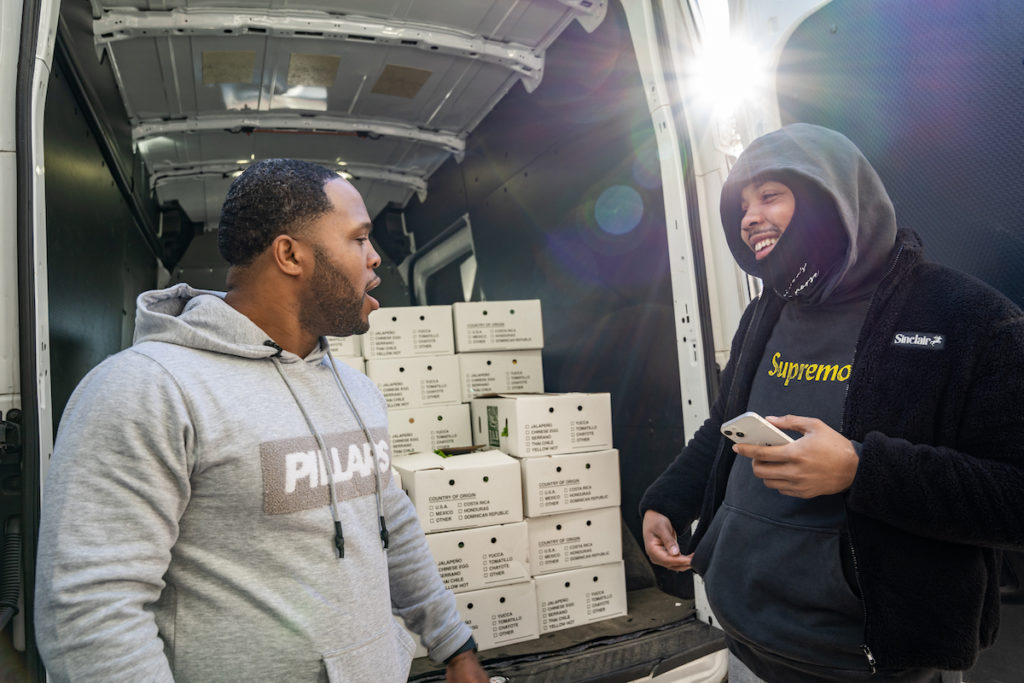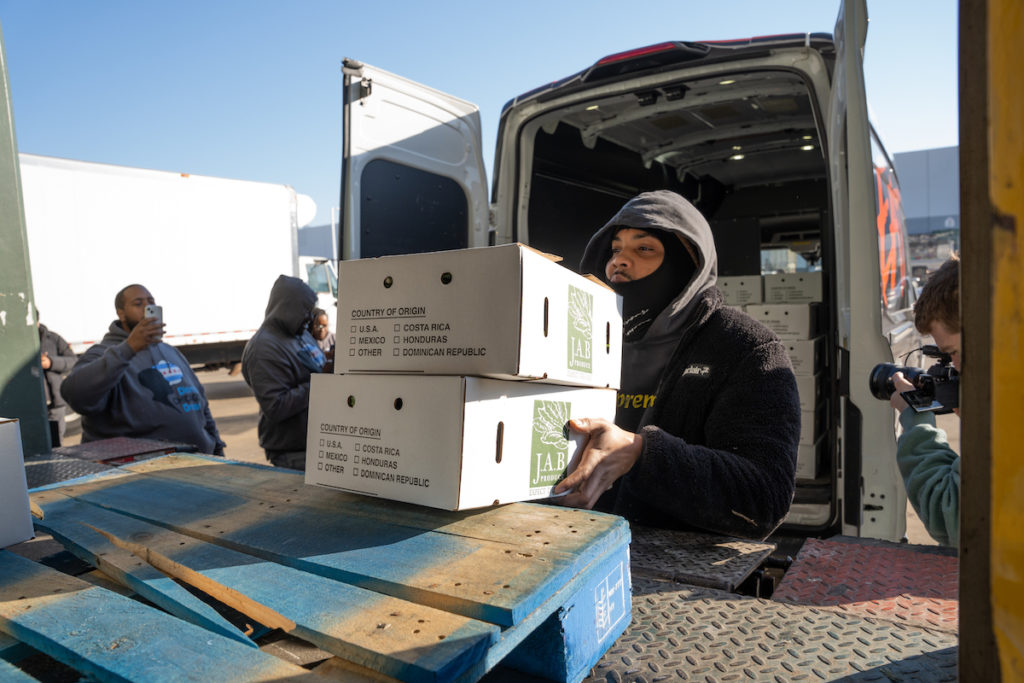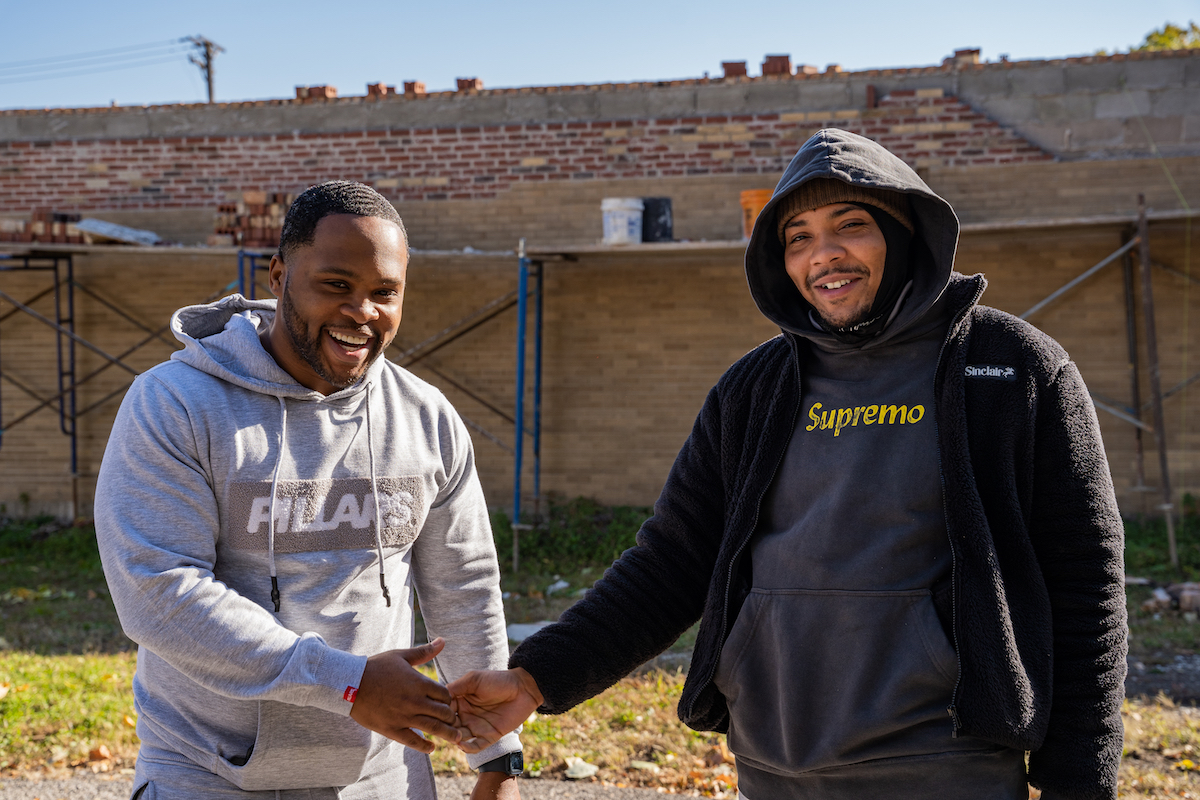Chicagoans are no strangers to the idea of combining efforts to feed their neighbors. When Chicago Public Schools (CPS) halted free meal distributions at the beginning of the COVID-19 pandemic, restaurant owners, activists, food banks and community groups took matters into their own hands and found ways to break bread across the city. Other initiatives like Market Box began as a pandemic mutual aid response but continue to provide fresh food to households across the South Side. It goes without saying, many Chicagoans are well-acquainted with finding a way to provide what is needed on their own. Dions Chicago Dream is a prime example of these efforts.
What Dion Dawson started two years ago as a way to address a lack of consistent access to quality fresh food has blossomed into an organization that has distributed over 200,000 pounds of produce to date. Now, he’s partnering with G Herbo and the rapper’s mental health initiative, Swervin’ Through Stress, in order to broaden their impact on the residents of the city they so proudly call home.
The Weekly sat down with G Herbo and Dion Dawson to discuss the intersection of mental health, music, influence and remedying food insecurity. What seem to be unrelated at face value have proven to work well together to improve the quality of life. “Food insecurity goes hand in hand with stability and safety,” G Herbo said.

“You know, I come from poverty for real. So I understand without the proper nutrition or the proper support system in general it breeds violence, it breeds anger. It breeds no self-discipline—if you don’t have food, where I come from, the first instinct is to go out and take, to go steal.”
Proudly representing Over East and the South Side of the city, G Herbo is more than familiar with the struggles of the communities he’s making an effort to serve. This familiarity is what prompted the creation of Swervin’ Through Stress, geared toward helping young people struggling with post traumatic stress disorder (PTSD). In light of his current success as a musician, there’s no better time to address the challenges faced by young people coming out of the violent and inequitable circumstances he was raised in.
“I think it’s important for artists to do philanthropy work. I think other than entertainment, rap music and hiphop is the biggest platform when it comes to influence—I think we have the most influence on the youth. And with philanthropy work, it shows kids, ’nah, that’s not cool, this is the right thing to do.’” G Herbo said. “I know, for a fact, things won’t get better in the city unless you empower the youth.”
Dion admires artists like G Herbo, who make something of themselves and still return to find solutions for the issues their communities continue to face. “There’s no denying how many people he inspires with his story. There’s no denying how many people he’s touching through his music, there’s no denying that he’s a Chicago kid, like all of us,” Dion said. “When you’re looking at Swervin’ Through Stress, which is just starting to really get its groove, he found something that related to him and his story, which is about the mental health aspect, and we have food, and we know both of those go hand in hand.”
G Herbo similarly draws a clear line between mental health advocacy and access to food, and further connects the two to the cycle of violence. “Mentally, when you’re hungry, you just feel like you on your own and nobody cares. You develop that [thought] throughout the world. When you feel like you’re on your own, you treat people as such, you treat people like you don’t care for them since you feel nobody cares for you,” he said.
The rapper cites that violence is worsened by a lack of unity and support between community members who may not understand the impact they can have on the next person. “Nobody really shows support to one another or make anybody feel like, ‘Hey, I’m here, you could just talk to me, and then if I can help you in any way, then I will,’” he said.
The uptick in crowdfunding and mutual aid efforts in the past couple of years have shown what is possible when people put their minds, time, and money into projects that provide for those in need. Dion and G Herbo believe in the importance of doing one’s part and making use of the resources available. In Dion’s case, this has also included creating those resources in order for his organization to have an impactful reach.
“I never fundraised before I started my org. But what I saw was even the big international organizations, they petition monthly donors, they go out and find different ways to raise money. And so the only thing I did was, I don’t shy away from having to raise money,” Dion said.
The fight to remedy the disparities that have their shared communities in a chokehold is not just for the sake of philanthropy—it’s personal. “I love my city. I love the neighborhood that I grew up in and I want to make those environments safe. I want to make those environments positive. I want to make sure the kids become the best version of themselves like I did. I was just a diamond in the rough,” G Herbo said, adding that without God and his own fearlessness and sacrifices he made, he would not have made it.
But he wouldn’t wish that experience on others. “It shouldn’t have been like that for me. I should have had all the resources to just be great, period. I shouldn’t have had to do those things and endure a lot of the things that I endured growing up, just to get here today,” he said.
The harsh reality is that many young people are forced to develop survival tactics as a result of their environments, and the situations they encounter are not mild; it’s life or death.

“Philanthropy is important for me because these kids shouldn’t have to lose their innocence at such a young age,” G Herbo said, “They should automatically have the resources that they need to go out and be successful, to have a good day through school, to strive, to go to college to go do whatever it is that they want to do in life, and I think people like myself, with providing those resources and those opportunities for the kids, it makes life that much easier.”
He still hopes for changing resources for his community despite being fortunate enough to have left those circumstances behind. “It’s important for me because I have kids. I don’t want my kids to grow up with certain advantages that other kids like myself didn’t have,” G Herbo said. “My kids should not have more advantages than the regular African-American child that’s growing up in the inner city and these poverty stricken neighborhoods that I grew up in. And that’s just me being real.”
When Dion spoke of the intersection between influencing youth and philanthropy, he implores others to focus on their own individual contributions, rather than comparing themselves against each other. “I think we have to understand that not everybody can do what Herb does, and not everybody can do what I’m doing. But they can do their part,” he said. “It’s about motivating people to think beyond where they are.”
There’s no debate that a lack of access to fresh and healthy food decreases both quality of life and life expectancy—and in Chicago, this primarily affects Black and brown communities on the South and West Sides. According to an NYU study published in 2019, of the 500 cities surveyed, Chicago has the widest life expectancy gap between communities: a difference of thirty years between Streeterville and Englewood. When discussing the effects of food insecurity, it may be easy to overlook the domino effect these scarcities can have on the overall health and well-being of a community.
Dion himself is from Englewood, where a Whole Foods closed this week despite being opened in order to combat the food desert it was built in. In his opinion, this is a perfect example of the importance of community- owned and run projects that are not only effective, but sustainable as well.
“It was important for me that nobody dictate where we are going and what we do,” Dion said. “All of our delivery vehicles and our Sprinter [vans] and our twenty-foot truck, we own it. And when we’re talking about our staff, not getting around paying them, because we’re also creating a problem if we have people working or volunteering in food justice, and they’re not even taking care of themselves.”
Through what the organization calls Dream Deliveries, one thousand dollars provides a household with a year’s worth of fresh produce. The quality of the food, which is arguably better than what you may find in the grocery store, comes directly from a wholesale grocer.
“Initially when we started Dream Deliveries, we took a map of the bottom ten percent average household income neighborhoods and then superimposed a map of food deserts in the city. We canvassed and enrolled,” Dion said. “After that, it has been word of mouth.”
The organization has minimized enrollment through their website with the intention of being considerate of older residents and community members who don’t have consistent internet access. “Once our waitlist is under fifty homes, we will open sign-ups online,” he said. Currently, the waitlist has 397 households.
Dion stresses the importance of the impact being more than just a story, and he looks to the numbers of families served as a marker of that impact. “This is not Herb and his team thinking or hoping we’re doing it, this is them knowing that we’re doing it,” he said. According to Dion, by the end of November, the organization will reach 500 homes and over 2,600 residents weekly, while distributing 18,000 pounds of food across twenty-five Chicagoland neighborhoods monthly.
When it comes to problems as complex as food insecurity, Dion has witnessed that there is no linear timeline to solving this issue. “A lot of the progress that was made in food justice, over the last decade or so, was wiped out because of the pandemic and the problem got worse,” he said.
“I never ever, ever, ever, ever use the word ’goals’—whatever we say we doin’, we do that shit. Because nobody would expect an org that started with no money to be a million dollar organization two years later, they wouldn’t expect us to start with one community fridge and end up with five delivery vehicles, [and] nine employees.”
The catalyst of his organization, Dion’s Dream Fridge, was launched in September 2020, and is located on the corner of 57th and Racine in Englewood. The community fridge is open Monday through Friday from 9am to 4pm, and is stocked daily with fresh produce and water.
Having recently dropped a project, titled Survivor’s Remorse, G Herbo has had his hands full with music video releases, traveling, and all that comes with being an artist. Still, he finds time for what he deems necessary and important. Losing sleep is a reasonable sacrifice in his opinion because “people make time for what they want,” the rapper said. “And this is one of those things that’s important to me.”
A memory G Herbo holds dear is that of his aunt volunteering to serve the community since he was a child. Whether it was a local youth center or the Boys & Girls Club, no matter where they moved she made it a point to be involved. “She still does it to this day—the kids love her. And a lot of these kids don’t have that sense of unity and family at home, so the only place they get it is at school and in these extracurriculars.”
“It’s a lot of beautiful things that come from it,” G Herbo said of the South Side. Although hardships can easily become the focal point of one’s experiences, he shared how growing up in these neighborhoods also made him better. “Us not having much, but still trying to stick together, you know, that’s where people learn loyalty.”
As for Dion, the sky’s the limit as to where his dreams can go. The partnership between Dion’s Chicago Dream and Swervin Through Stress plans to bring 50,000 pounds of fresh produce to residents across Chicago. “I’m like South Side Weekly, man! If I’m breathing, I’m doing this shit. If I’m breathing, I’m putting numbers on the board,” he said.
To learn more about this collaboration, visit dionschicagodream.com and follow G Herbo on Instagram @nolimitherbo.
Chima Ikoro is the Weekly’s Community Builder.

